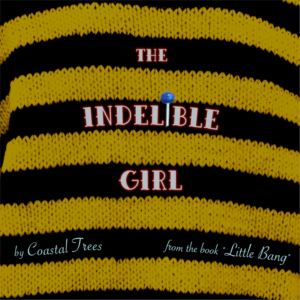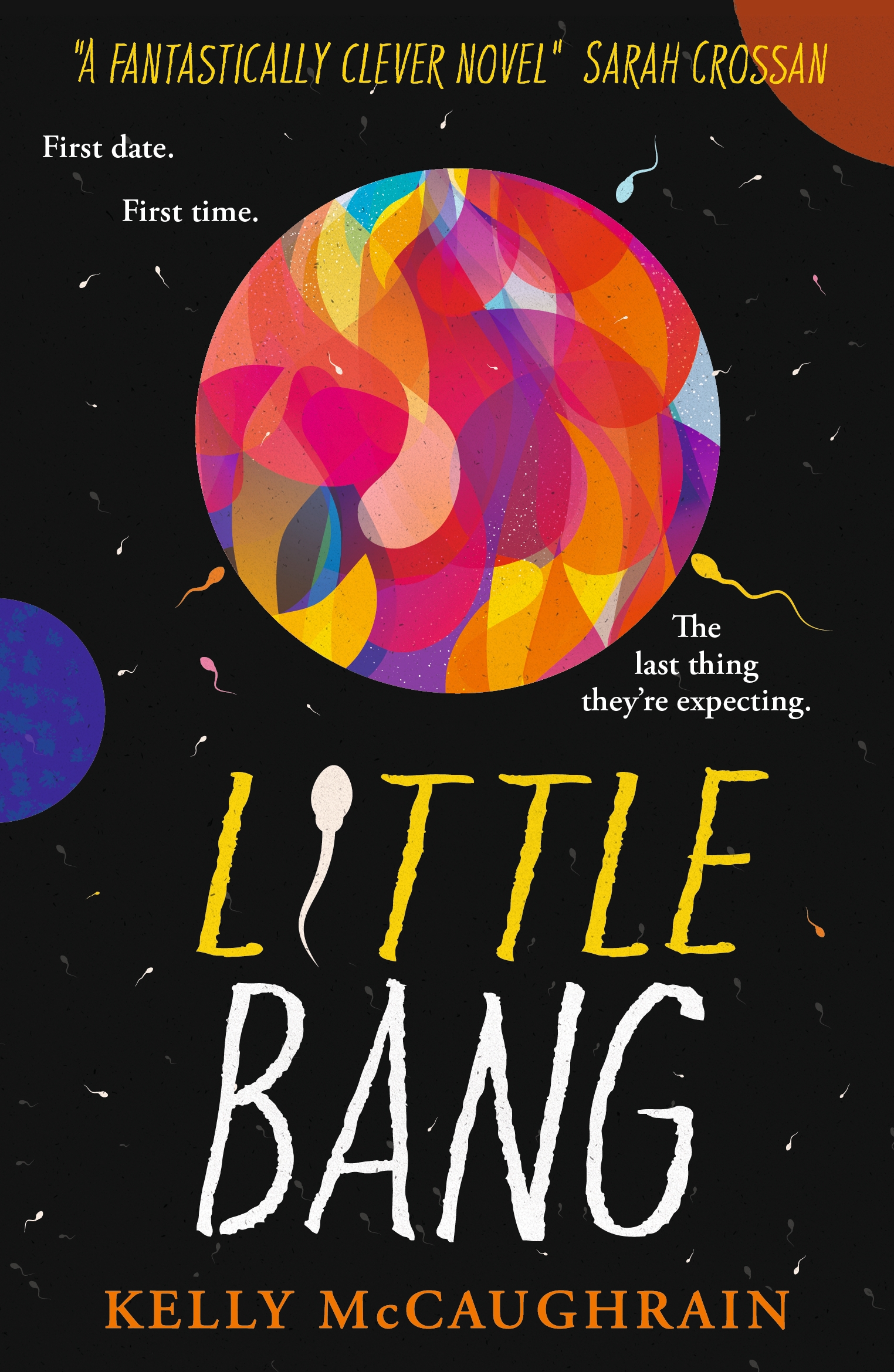“Someday there’ll be a unified theory of the entire universe. But there will never be a unified theory of what I should do with this pregnancy.”
Beneath the New Year’s Eve fireworks, shy science-nerd Mel and slacker songwriter Sid get pregnant on their first date.
Any sixteen-year-olds would expect trouble – but this is Northern Ireland 2018, where abortion is still illegal. Mel’s religious parents insist she must keep the baby, whilst Sid’s feminist mum pushes for an abortion.
Mel and Sid are determined to do this together, but they soon discover that pregnancy is totally different for boys and girls. As their relationship starts to crack under all the pressure, Mel finds herself feeling alone with the impossible dilemma of the Little Bang growing inside her.
Available from all major book chains. Please support your local independent bookstores if possible!
Bookshop.org Waterstones Amazon
Also available as an audiobook narrated by Myles Milliken and Saoirse-Monica Jackson
Awards
- Shortlisted for the Carnegie Medal for Writing 2025
- Shortlisted for the KPMG Children’s Books Ireland Awards 2025
- Shorlisted for the Weydon Multi Academy Trust Book Awards 2025
- Shortlisted for the North East Teen Book Awards 2025
- Longlisted for the UKLA Book Awards 2025
- Selected for the Empathy Lab’s Read for Empathy Collection 2025
- Reading Zone Book of the Month
- Love Reading 4 Kids Book of the Month
- Easons Book of the Month
- Children’s Books Ireland Recommended Irish Reads 2024 Editor’s Choice
“A fantastically clever novel which feels completely relevant” – Sarah Crossan
“Both expertly crafted and deeply true. Reading it I had a sense that I was hand in hand with my teenage self” – Deirdre Sullivan
“The main characters are so real they leap off the page and the writing is so full of love and emotion the pages practically pulse. I LOVED it. I can’t remember the last time I felt so emotional about a book. I can wait to press it into people’s hands in January. Everyone who loved Derry Girls – this is the book for you! Full of warmth, northern Irish humour, heartbreaking teen decisions, messy teen glory.” – Sarah Webb
“I could not put this book down. I was rooting for Mel and Sid from the very first line. This is an honest, heartfelt and truly humane book about an incredibly important subject. It’s also an utterly engrossing read.” – Jan Carson
“A brave, honest, nuanced treatment of the story. This book will open up discussions, and hearts and minds.” – Sheena Wilkinson
“Thought provoking and deeply human.” – Sue Divin
“Little Bang has everything I want from YA: a real story with real, complex characters, beautifully told. This is the story that Northern Irish readers have been waiting to hear, but it’s also one that we’ve longed to share. To have those big, weighty issues approached with a lightness and humour that made me laugh out loud is the mark of a very skilled writer who has put the work in. A (little) banger!” – Shirley Anne McMillan
“Romantic, funny, important. McCaughrain’s prose is absolute magic.” – Jenny Ireland
Why I wrote the book
I’m ashamed to admit that, when Ireland announced its abortion referendum in 2018, I knew so little about the subject I honestly wasn’t sure which side I was on. And then I started to wonder why I knew so little. Why wasn’t it talked about in school? Why wasn’t it talked about anywhere?
I set out to educate myself and, the more I read, the angrier I became about how little I’d known about abortion at a time in my life when it could have shaped my whole future. I also found that not much has changed and young people are still woefully uninformed about it today.
As the laws in Ireland and Northern Ireland changed, the stories of women forced to travel for abortion began to tentatively emerge and I was struck by the sense of isolation and loneliness in those stories. Everyone knows someone this has happened to, and yet everyone seems to go through it alone. I found myself itching to write something that would honour those invisible histories and offer support to young people today. It became a warm and funny love story that’s also about abortion, parenthood, bodily autonomy, gendered double standards, and the choice to not have children at all – all the big stuff that no one talks to teenagers about until it’s too late.
Little Bang is the book that wasn’t there for me and my friends in Northern Ireland when we were young, and still isn’t there for many teens around the world. I hope it will start some conversations and I hope you’ll love Mel and Sid as much as I do
Sid’s Song
Sid is a singer-songwriter and the band, Coastal Trees, have brought him to life by putting one of his songs to music and recording it! It’s such a beautiful track and this made me so happy! Check it out on their Spotify!

And you can hear the playlist we used for the launch party here!
History
In the course of researching this book I discovered so much interesting information that I couldn’t fit into the story, or even into the historical note at the back. You could write a whole book just on the history of abortion legislation in NI and Ireland, so this is still far from the full picture but, for anyone who’s interested, this is a fuller version of that historical note.
Abortion was first banned in the UK and Ireland in 1861. While the UK’s Abortion Act 1967 allowed for abortion in the UK up to 28 weeks (reduced to 24 weeks in 1990), Ireland’s abortion laws remained among the strictest in the world. In fact, in 1983 Ireland introduced a new constitutional amendment (the Eighth Amendment) that would prevent any relaxation of their abortion laws.
Ireland’s laws came under global scrutiny in 1992 when a 14 year old girl who’d been raped tried to travel to the UK for an abortion. Ireland’s Attorney General prevented this via an injunction. The girl became suicidal and the Supreme Court lifted the injunction and ruled that abortions could be allowed if there was a risk to the life of the mother through suicide. It was 20 years before the Supreme Court’s ruling made it into legislation, but two further referendums in 1992 made it legal for Irish people to travel abroad for an abortion and to share information about overseas abortion services.
The country’s strict laws again came under global scrutiny in 2012 following the death of Savita Halappanavar, who died from sepsis during a miscarriage in a Galway hospital because staff refused to terminate the pregnancy. The United Nations Human Rights Commission criticised Ireland’s abortion laws and in 2017 Prime Minister Leo Varadkar announced a referendum (a public vote) on repealing the Eighth Amendment. It was held in 2018 and ended in a two thirds landslide in favour of ending the abortion ban. Since then legislation has allowed abortion in the first 12 weeks of pregnancy and up to 24 weeks in exceptional circumstances.
Meanwhile in Northern Ireland…
Although Northern Ireland (NI) is part of the UK, it has its own government. The UK’s 1967 Abortion Act did not extend to NI. Abortion was permitted in NI when the mother’s life was at risk or there was a risk of permanent or serious damage to her mental or physical health, but guidelines on when abortions could be carried out were unclear, making it difficult for medical staff to make judgements, and when they were revised in 2012 the emphasis on medical legal culpability created a ‘chilling effect’ that saw the number of abortions performed annually plummet to almost single figures.
In 2013 Sarah Ewart spoke out about having to travel from NI to England for an abortion because her baby had a fatal foetal abnormality. Proposals to permit abortions in these cases, and in cases of rape or incest, were rejected by the NI government in 2016.
In 2017 the British government announced they would fund abortions in England for people from NI.
In 2018 a United Nations committee declared the UK had breached the rights of women in NI by limiting access to abortion.
In 2019 Labour MP Stella Creasy’s proposal to decriminalise abortion in NI was supported by Westminster MPs and required the UK government to intervene and create new abortion laws in NI. Despite opposition by some parties in the NI government, abortion was decriminalised in NI in October 2019. Days later Belfast’s Crown Court dropped a case against a woman being prosecuted for buying abortion pills for her teenage daughter.
The new legislation allows abortions in all circumstances in the first 12 weeks of pregnancy, up to 24 weeks in cases where there is a risk to the physical or mental health of the pregnant person, and beyond that in very limited circumstances. However, commissioning of abortion services was delayed by the NI government until Westminster again intervened. In May 2022 the UK government instructed the NI Department of Health to implement abortion laws and set up fully funded abortion services. At the time of writing (2023) this is ongoing; post 12 week abortions are rarely performed, and many people are still travelling.
Decriminalisation means the law in NI is now more progressive than that in the rest of the UK. Abortion has never been decriminalised in England, Scotland, or Wales; the 1967 Act provides a legal defence for doctors to perform abortions under certain conditions, but it remains a criminal offense under the Offences Against the Person Act 1861 and at the time of writing there are people on trial for managing their own abortion in England. This often affects the most vulnerable people, including those who can’t get to a clinic for reasons such as poverty or abusive relationships. You can read about the campaign for decriminalisation on BPAS’s website.
Further Information about Issues in Little Bang
BPAS – British Pregnancy Advisory Service
IFPA – Irish Family Planning Association
AFC – Alliance For Choice
Common Youth
Brook
Faith Voices for Reproductive Justice
